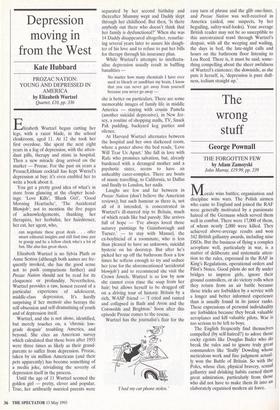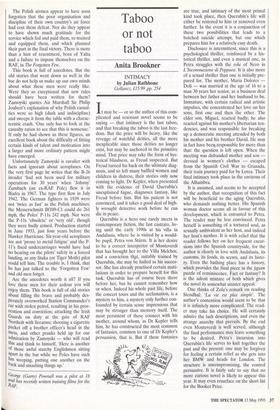The wrong stuff
George Pownall
THE FORGOTTEN FEW by Adam Zamoyski John Murray, £19.99, pp. 239 Morale wins battles; organisation and discipline wins wars. The Polish airmen who came to England and joined the RAF were generally motivated by a passionate hatred of the Germans which served them well in combat. There were 17,000 of them, of whom nearly 2,000 were killed. They achieved above-average results and won 342 British gallantry awards, including nine DSOs. But the business of flying a complex aeroplane well, particularly in war, is a matter of deliberate and systematic atten- tion to the rules, expressed in the RAF in King's Regulations, operational orders and Pilot's Notes. Good pilots do not fly under bridges to impress girls, ignore their ground controllers, or do victory rolls when they return from an air battle because those tricks are forbidden by a service with a longer and better informed experience than is usually found in its junior ranks. These expressions of personal individuality are forbidden because they break valuable aeroplanes and kill valuable pilots. War is too serious to be left to boys.
The English frequently find themselves compelled (by self-hatred?) to adore those cocky egoists like Douglas Bader who do break the rules and to ignore truly great commanders like 'Stuffy' Dowding whose meticulous work and fine judgment actual- ly won the Battle of Britain. So with the Poles, whose élan, physical bravery, sexual gallantry and drinking habits earned them great admiration, particularly from those who did not have to make them fit into an elaborately organised modern air force. The Polish airmen appear to have soon forgotten that the poor organisation and discipline of their own country's air force had cost them defeat. Nor do they appear to have shown much gratitude for the service which fed and paid them, re-trained and equipped them, and which planned their part in the final victory. There is more than a hint of resentment, born of Yalta and a failure to impose themselves on the RAF, in The Forgotten Few.
This book is full of anecdotes. But the old stories that went down so well in the bar do not help us make up our own minds about what these men were really like. Were they so exceptional that new rules should have been written for them? Zamoyski quotes Air Marshall Sir Philip Joubert's explanation of why Polish casual- ties were so high (dash and indiscipline) and sweeps it from the table with a charac- teristic crash. 'One only has to look at the casualty ratios to see that this is nonsense.' If only he had shown us these figures, an excellent book about the difficulty of fitting certain kinds of talent and motivation into a larger and more ordinary pattern might have emerged.
Unfortunately Zamoyski is cavalier with facts and ignorant about aeroplanes. On the very first page he writes that the B-26 invader 'had not been used for military operations for 30 years' when 'Johnny' Zumbach (an ex-RAF Pole) flew it in Biafra in 1967. The type first flew in July 1942. The German fighters in 1939 were not 'twice as fast' as the Polish machines; the Messerschmitt Bf109-C1 could do 261 mph, the Poles' P-11s 242 mph. Nor were the P-11s 'obsolete' or `very old', though they were badly armed. Production started in June 1933, just four years before the Hawker Hurricane. Six-year-old aeroplanes are not `prone to metal fatigue' and the P- 11's fixed undercarriages would have had no bearing on the pilots' safety in a forced landing, as any Stuka (or Tiger Moth) pilot could tell him. The trouble is, I think, that he has just talked to the `Forgotten Few' and old men forget.
Are the anecdotes worth it all? If you love these men for their ardour you will enjoy them. This book is full of old stories about filling the brave and probably des- perately overworked Station Commander's car with stolen petrol, resulting in his pros- ecution and conviction; attacking the Irish Guards on duty at the gate of RAF Northolt with firearms; shooting a cigarette Packet off a brother officer's head in the mess, and other pranks held up for our admiration by Zamoyski — who will read this and think to himself, 'Here is another of those awful starchy Englishmen sitting apart in the bar while we Poles have such fun weeping, patting one another on the back and smashing things up.'
George (Gary) Pownall was a pilot at 18 RAF. Qnd has recently written training films for the



































































 Previous page
Previous page